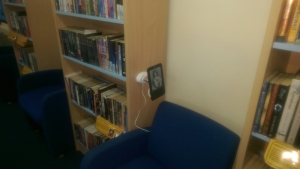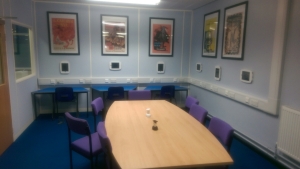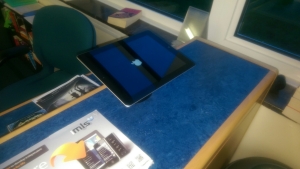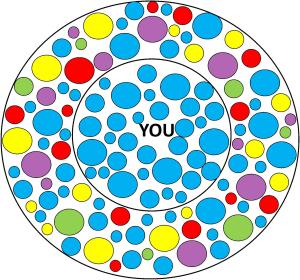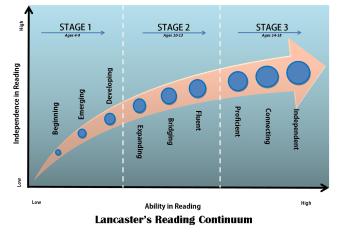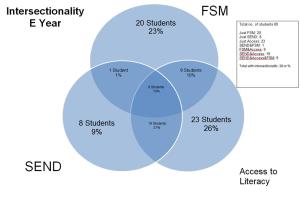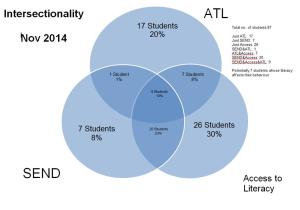So we’ve always been a bit different in our school library. Not different for the sake of being different but different in responding to our students needs and remembering that when it comes to information, reading and libraries there is nothing that is set in stone. No methodology, no process or way of doing things that cannot be changed or adapted to match and meet the needs of our users.
It is with this knowledge and understanding that we have gone through a process of rethinking how students access information and what we can do to make this as easy and successful as possible.
In doing this we needed to think about those things that are providing barriers to the students accessing information successfully and willingly. In knowing that there is nothing set in stone is quite refreshing as it means that everything is up for grabs. This means that we have a blank canvas where we can put the students needs first instead of trying to force them to conform to an outdated model.
This is not only in terms of how they can go about finding information but also about how they can access information too. We thought long and hard about all these things and spent a lot of time talking to students and teachers and watching how students find, pick and view information. An idea that everyone working in school libraries should spend time doing anyway.
From this refreshing viewpoint we started to work out what it was we wanted to achieve and what we wanted to achieve was a couple of different things. The first was a way of organising our stock to make it not only as simple as possible but also organised in such a way that students want to use this type of information instead of going straight to the internet. This was one of the biggest issues and one that from talking to the students you can understand. The internet is seen as an easy alternative, even if we know it isn’t, students perceive it to be. So the question becomes ‘how can we make accessing information in books as simple as possible?’
Now, this is where I may lose some people and don’t get me wrong I do really like Dewey. However I honestly feel that if we stick to certain systems ‘just because’ then we can’t go about actually making anything better. If you want some more of my opinions on Dewey then please see this past blog post. It is also interesting that a lot of the librarians I’ve had comments back from are more than willing to change their fiction collection and ordering system and stickering process to the extreme to ‘make it easier’ for students to access yet won’t even consider doing this in the non-fiction collection. It seems that there is almost a ‘precious’ nature around Dewey and that it ‘belongs’ to libraries and librarians so shouldn’t even be changed?
I won’t go into any more detail about Dewey except to say that we shouldn’t let anything limit our students from being able to access information successfully and willingly.
From our conversations with students and our observations of students we felt that the way stock was organised in the library was by no means conducive to students wanting to and being able to find information quickly and successfully. This became more than just signage it was about the fundamentals to how a library was organised.
At the time we were in a very lucky position where small amounts of money was being made available to improve the library facilities (as well as bidding for lots of different pots). Being a comprehensive state school this didn’t mean a bucket full of money or a complete rebuild. What it did mean though was that we had an opportunity, if we were clever, to be able to doing special to improve how students access and use information in the library.
As mentioned above this was going to include a new way to organise the books in our library and to allow access to information in very different ways. Many people have already heard me talk about our new model and I have been lucky enough to run numerous training course across the country and Europe on information searching and gathering in education sharing this, however I will recover it here for anyone that doesn’t know.
In schools a students life is split up into numerous sections in a very specific way. This is down to what year group they are in, which term it is and what subject they are currently studying. We therefore already had a model of information that students are not only used to but how they actually think. It therefore seems silly not to take advantage of this when we are trying to organise the information we have.
This began our thinking in trying to utilise this. We started to think what this might look like in terms of sorting our books and the result was to simply split stock up relating to the year group it was studied in, the term and importantly the subject that was covering it. It was one of those moments that you think to yourself ‘why haven’t we done this before, it’s just so obvious!’ To achieve this we needed to know specifically what was being studied across the curriculum and when, not necessarily a easy feat to achieve but one made easier by the fact that we were also going through a whole information literacy revolution in school where we were changing the idea of homework and moving it towards research and preparation for learning and encouraging more learning outside of the classroom . This is also set through our information literacy model OPUS (found here). Through this departments created subject overviews which were perfect to be able to make available to parents but also were to be used to allow us to know how to organise the stock.
We specifically purchased the right types of shelving (from Peters suppliers in Birmingham their ‘4-Square’ unit) which allowed us to create 4 shelves on each side. On this we were able to put the subject overview and signage at the top and then create a shelf for each of the KS3 year groups. We decided to stick for KS3 as there was a lot more rigidity in the KS3 curriculum to make this process easier. From just this small change and restructure the amount of non-fiction books that have been issued to students has dramatically increased. Books that were never touched have suddenly become extremely useful because students can easily access them and the information, almost quicker than logging on to the computers! Due to the fact that we do prep students are being conditioned to think ahead in their learning so we have also noticed that books are going out ahead of time as students read up on what they are going to be learning in preparation.
Alongside changing the way students access physical books we also wanted to look into how they go about accessing other types of material and information. We wanted to provide them with the opportunity to access e-material and online resources in as easier a way as possible. To allow this to happen we introduced a number of devices around the library. These had access solely to our library catalogue, to our ebook lending facility as well as devices where they could access a range of apps and the internet.
These have proved successful for a number of different reasons. The ones that we have allowed access to the internet and apps have further promoted our desire for students to use more info lit skills. With an e-device students cannot copy and paste information. It requires them to read, make notes and so their learning is much deeper because of this. As the devices are a lot quicker to load than the computers students are choosing to use these over the computers and because of this we are getting more students, sub-consciously improving their information literacy and note-taking skills.
The other devices dotted around the library are giving students quicker and better quality access to information and allowing them to be more independent in their use of the library and their studies. So much so we have extended this into our reading for pleasure areas by making kindles, talking book stations etc available to students to use for reading for pleasure. Again this is giving students more options in how they can access books and the result is that many more students are reading because these are available for them.
